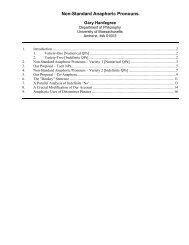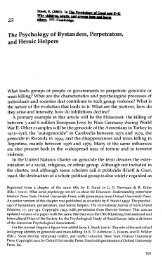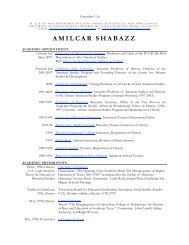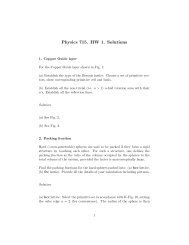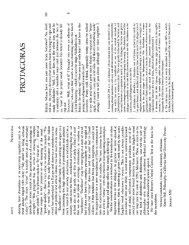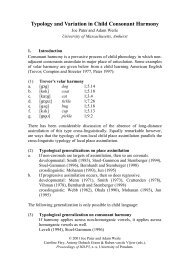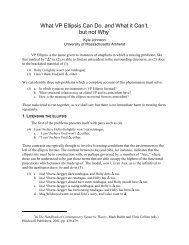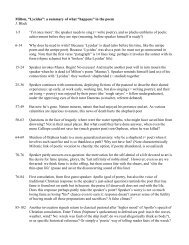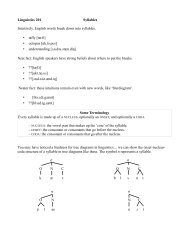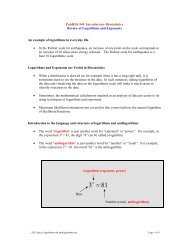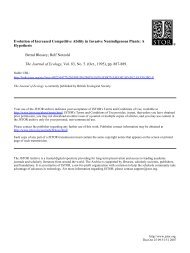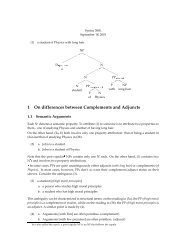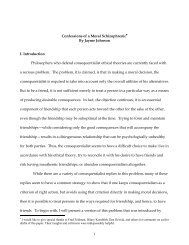Aristotle's Definitions of the Soul: "De Anima" ii, 1-3
Aristotle's Definitions of the Soul: "De Anima" ii, 1-3
Aristotle's Definitions of the Soul: "De Anima" ii, 1-3
Create successful ePaper yourself
Turn your PDF publications into a flip-book with our unique Google optimized e-Paper software.
totle inconsistency, change <strong>of</strong> mind, or mystery-making.13 But <strong>the</strong> inconsistency,<br />
if such <strong>the</strong>re be, is so bald that it is hard to see how Aristotle could<br />
have failed to face it. And <strong>the</strong> hypo<strong>the</strong>sized change <strong>of</strong> mind on <strong>Aristotle's</strong><br />
part is unacknowledged and has been hard to establish in any convincing<br />
way.14 So solutions depending on <strong>the</strong>se things have not been satisfying.<br />
And it seems too much out <strong>of</strong> character that Aristotle should simply have<br />
regarded <strong>the</strong> whole matter as an impenetrable mystery for that proposal to<br />
be satisfying.<br />
4. Do <strong>the</strong> remarks which Aristotle makes at <strong>the</strong> beginning <strong>of</strong> <strong>De</strong> A nima<br />
II, 2 about various types <strong>of</strong> definition and about <strong>the</strong> defects in <strong>the</strong> account<br />
<strong>of</strong> <strong>the</strong> soul in II, 1 help us to more satisfactorily resolve any or all <strong>of</strong> <strong>the</strong>se<br />
difficulties?<br />
As we saw earlier, <strong>the</strong> definition, or definitions, <strong>of</strong> <strong>the</strong> soul in <strong>De</strong> A nima<br />
II, 1 are implied by II, 2, 413 a 16, to be like conclusions (OuuR%ep&ixlrx).<br />
That word is used in Posterior A nalytics II, 10 to describe one <strong>of</strong> <strong>the</strong> three<br />
types <strong>of</strong> definition discussed <strong>the</strong>re (94 a 7-9, 13-14). This type <strong>of</strong> definition<br />
is contrasted both with <strong>the</strong> indemonstrable account <strong>of</strong> what something is<br />
and with <strong>the</strong> syllogistically based account <strong>of</strong> what something is.'5 The third<br />
type <strong>of</strong> definition,16 and hence <strong>the</strong> sort we are dealing with in <strong>De</strong> Anima II,<br />
I, is <strong>the</strong> so-called nominal definition - <strong>the</strong> account <strong>of</strong> what a name signifies<br />
(93 b 30).'7 What implications <strong>of</strong> this result are relevant for our purposes?<br />
A nominal definition is <strong>the</strong> account <strong>of</strong> some entity or phenomenon<br />
which we have at <strong>the</strong> initial stages <strong>of</strong> inquiry before we have an account <strong>of</strong><br />
its essence. The definition encapsulates <strong>the</strong> central items <strong>of</strong> information<br />
about an entity which we have at a given pre-terminal stage.'8 These<br />
central items <strong>of</strong> information'9 will, in <strong>Aristotle's</strong> view, typically concern<br />
explicable features <strong>of</strong> <strong>the</strong> entity under investigation. So he characterizes <strong>the</strong><br />
definitions which display <strong>the</strong>se features as "conclusions"(avRnpep&u-<br />
iu,rr).20 There are, for Aristotle, two characteristic types <strong>of</strong> definition<br />
which function as conclusions <strong>of</strong> syllogisms - those which exhibit a feature<br />
(but not <strong>the</strong> whole) <strong>of</strong> <strong>the</strong> essence <strong>of</strong> <strong>the</strong> entity defined, and those which do<br />
not exhibit even an element <strong>of</strong> <strong>the</strong> essence but do exhibit some proper (xLO'<br />
o0'r6) feature which is explicable by reference to <strong>the</strong> essence.2' The first<br />
type will exhibit a feature necessary but not sufficient for <strong>the</strong> presence <strong>of</strong><br />
<strong>the</strong> thing. The second will, characteristically, exhibit a feature sufficient<br />
but not necessary for <strong>the</strong> presence <strong>of</strong> <strong>the</strong> thing.22<br />
Aristotle takes it that nominal definitions signify a kind and delineate<br />
<strong>the</strong> reference <strong>of</strong> <strong>the</strong> name <strong>of</strong> a kind.23 How do <strong>the</strong>y do this when <strong>the</strong>y only<br />
exhibit features necessary or sufficient for membership in <strong>the</strong> class denoted<br />
by <strong>the</strong> name <strong>of</strong> <strong>the</strong> kind but not both? Aristotle holds that grasping a<br />
263



